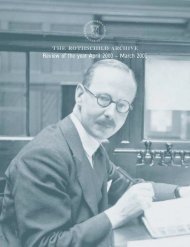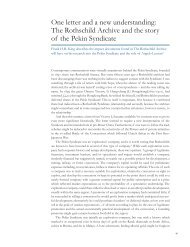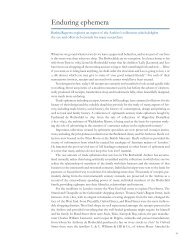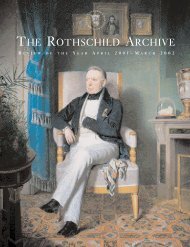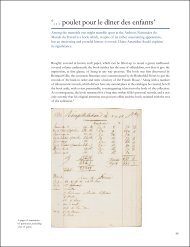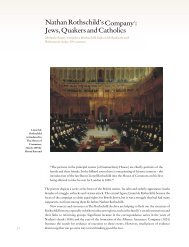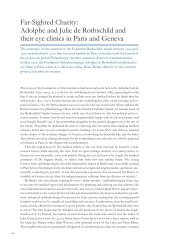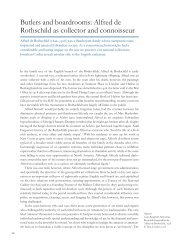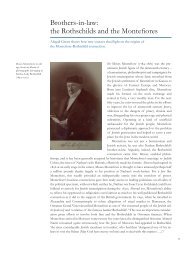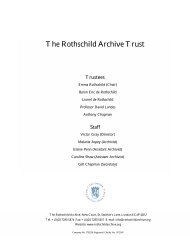66900 Rothschild Archive - The Rothschild Archive.
66900 Rothschild Archive - The Rothschild Archive.
66900 Rothschild Archive - The Rothschild Archive.
You also want an ePaper? Increase the reach of your titles
YUMPU automatically turns print PDFs into web optimized ePapers that Google loves.
Alexander Herzen<br />
and James de <strong>Rothschild</strong><br />
Among the private clients of the House of <strong>Rothschild</strong> in the mid-nineteenth century<br />
few can seem more incongruous in that company than the Russian socialist, and<br />
avowed revolutionary, Alexander Herzen (1812–1870). Derek Offord examines the<br />
relationship.<br />
By turns novelist, libertarian political philosopher, political exile, journalist and autobiographer,<br />
Alexander Herzen arrived in Paris with his family on 25 March 1847, ₁ in the early stages of the<br />
Grand Tour then popular among Russian noblemen. <strong>The</strong> years 1847–1852, which he spent in<br />
the francophone world before settling in London, were very productive for Herzen from a literary<br />
point of view, yielding the various cycles of letters that were eventually published as Letters<br />
from France and Italy and a number of essays that outlined his ‘Russian Socialism’, as well as the<br />
work that he regarded as his masterpiece, From the Other Shore. <strong>The</strong>y were also a period of great<br />
political disappointment for him. He was severely shaken by the defeat of all the European revolutionary<br />
forces that he supported in 1848–1849 and by the triumph of reaction or the consolidation<br />
of power in Western Europe in the hands of the bourgeoisie. <strong>The</strong> defeat was most<br />
crushing in France itself, where the workers’ insurrection of June 1848 was suppressed with<br />
much bloodshed by General Cavaignac and where Louis-Napoleon carried out a coup d’état in<br />
December 1851 and then, a year later, proclaimed himself Emperor Napoleon III. At the same<br />
time Herzen was buffeted by family turmoil and loss. In 1849–1850 his wife, Natalie, conducted<br />
a passionate affair with the German poet Georg Herwegh, whom the Herzens had befriended<br />
soon after their arrival in Paris. (Natalie’s adultery became known to Herzen at the beginning of<br />
1851.) On 16 November 1851 his mother, Luise Haag,² and youngest son, the deaf-mute Kolia,<br />
were drowned at sea in a shipping accident off the south of France. Finally, on 2 May 1852,<br />
Natalie died, weakened by childbirth, pleurisy and the emotional traumas of recent years.<br />
During Herzen’s passage through this turbulent period the Paris branch of the House of<br />
<strong>Rothschild</strong> was one of the most stable landmarks in his life, a haven that provided him and his<br />
family with security and much support. Students of Herzen have always been aware of his relationship<br />
with the bank, and with the founder of the Paris branch, James de <strong>Rothschild</strong>, in particular.<br />
Indeed Herzen himself alluded to it in his autobiography, My Past and Thoughts. And yet<br />
the relationship with James, which it is the purpose of this article briefly to examine, has been<br />
viewed through no lens other than Herzen’s own and has received no close attention. This<br />
lacuna might be partly due to the fact that some authoritative scholars who have written about<br />
Herzen have tended to idolise him both as man and socialist thinker,³ with the result that there<br />
has been a reluctance to dwell on an aspect of his life that might furnish grounds for a charge<br />
of hypocrisy against him. It might also be due, though, to the fact that scholars have not<br />
previously traced the direct documentary evidence of the relationship that is housed in <strong>The</strong><br />
<strong>Rothschild</strong> <strong>Archive</strong>.⁴<br />
Fundamental to Herzen’s political thought from the moment of his arrival in the West was<br />
the conviction that Western civilisation was in terminal decline. This conviction rested on the<br />
assumption that the bourgeoisie, which had become the dominant economic and social force<br />
in Western Europe, was morally bankrupt. <strong>The</strong> sole ruling passion of this class, of which<br />
Herzen always spoke with an air of immeasurable superiority, was ‘money-grubbing, profitmaking,<br />
stock-jobbing’ (v, 142).⁵ Herzen’s castigation of the bourgeoisie was enlivened in his<br />
39



